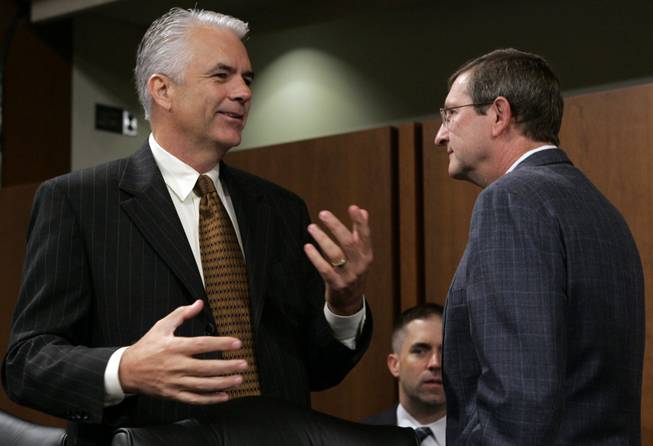
susan walsh / associated press
Senate Finance Committee members Sen. John Ensign, R-Nev., left, and Sen. Kent Conrad, D-N.D., talk Tuesday on Capitol Hill before the committee’s debate on health care legislation. Ensign spoke at length about his opposition to a government-run insurance plan.
Wednesday, Sept. 30, 2009 | 2 a.m.
Sun Archives
- Bigger premium discounts seen as a reward -- and a problem (9-27-2009)
- Harry Reid: Public option trigger 'pretty doggone good idea' (9-25-2009)
- Crafty wording for bill would help cancer institute (9-23-2009)
- Reid maneuvers for sweeter deal; some not impressed (9-23-2009)
- Harry Reid cuts Medicaid deal for Nevada (9-22-2009)
- Ensign will offer 30 tweaks to health care bill (9-22-2009)
- How the overhaul could alter the popular but costly Medicare Advantage (9-20-2009)
- Sticker shock: How the overhaul could exact a heavy toll on state finances (9-20-2009)
Sun Coverage
Sun Blogs
Republican Sen. John Ensign delivered one of the more curious arguments against a government-run, public health care option during a long and lofty Senate committee debate Tuesday.
People might like it and use it.
Then it would become popular, and too big to fail.
And the government would have to support it.
“Does anyone really believe this Congress will let this government program go away if it has a constituency?” Ensign asked his colleagues on the Senate Finance Committee. “To have a large program like this, once it’s started, you’re never going to get rid of it.”
The public option would be a government-run health care alternative to the private insurance market. It’s intended to provide an option for those currently without health insurance, and, through competition, rein in rising insurance costs.
It has become perhaps the most contentious element in the proposed health care legislation — dividing not only Democrats and Republicans, but also Democrats and Democrats — and is the focus of those trying to defeat the health care bill.
Supporters argue the public option would force insurance companies to compete for all the new business that health care reform would create. The insurance companies stand to gain millions of new customers as both the House and Senate bills require Americans to carry health insurance, just as most states require automobile insurance. More than 30 million Americans are uninsured.
The uninsured could choose to buy the government-run plan or private insurance (and the poor would qualify for an expanded Medicaid program). Those who ignore the new law and go without insurance would face fines.
Tuesday provided a first major test of the public option during an hours-long debate in the Senate Finance Committee, which is the final congressional panel to consider the bill. Committee members were considering two amendments to add the public option.
Democratic Sen. Jay Rockefeller of West Virginia, the leading advocate of the public option, delivered an impassioned speech.
Ensign helped hold up the Republican side of the opposition, sometimes drawing on his experience as a veterinarian. For the most part, his argument reflected Republicans’ contention that the new option would be a step toward socialized health care — that the public option would put private insurers out of business.
“All of this is a slippery slope toward complete government-run health care, complete government-run takeover of our health care system,” Ensign said.
Ensign scoffed at the suggestion, proposed in the amendments, that the public option would operate autonomously, relying on premiums paid by customers rather than federal funding. Once the plan got up and running, Ensign said, it would create its own constituency, and Congress would be afraid to kill it off even if it needed federal funding to survive, he said.
“As Ronald Reagan said, ‘The best way to ensure a life is to become a government program,’ ” Ensign said.
“These government programs start and they grow and they grow and they grow and they grow,” he said. “Government was set up to do the things we need it to do, not the things we want it to do.”
The amendments failed. Public option supporters vow to continue fighting on the Senate floor.
Ensign might be right. Should it be adopted, the public option might become too big to fail. Polls show most Americans — 65 percent, according to the latest New York Times/CBS News survey — support a public option.
Lisa Mascaro can be reached at (202) 662-7436 or at [email protected].

Join the Discussion:
Check this out for a full explanation of our conversion to the LiveFyre commenting system and instructions on how to sign up for an account.
Full comments policy